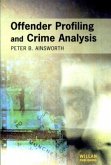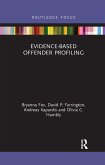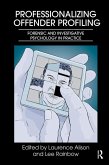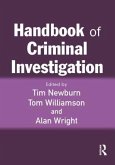Behavioural Analysis of Crime
Studies in David Canter's Investigative Psychology
Herausgeber: Youngs, Donna
Behavioural Analysis of Crime
Studies in David Canter's Investigative Psychology
Herausgeber: Youngs, Donna
- Broschiertes Buch
- Merkliste
- Auf die Merkliste
- Bewerten Bewerten
- Teilen
- Produkt teilen
- Produkterinnerung
- Produkterinnerung
Studies in investigative psychology require a special methodology, developed by David Canter to allow scientific explorations in such a challenging field, previously assumed not to be open empirical study. In this book the practical potential and applications of the research are given.
Andere Kunden interessierten sich auch für
![Offender Profiling and Crime Analysis Offender Profiling and Crime Analysis]() Peter AinsworthOffender Profiling and Crime Analysis58,99 €
Peter AinsworthOffender Profiling and Crime Analysis58,99 €![Evidence-Based Offender Profiling Evidence-Based Offender Profiling]() Bryanna FoxEvidence-Based Offender Profiling21,99 €
Bryanna FoxEvidence-Based Offender Profiling21,99 €![Professionalizing Offender Profiling Professionalizing Offender Profiling]() Professionalizing Offender Profiling47,99 €
Professionalizing Offender Profiling47,99 €![The Routledge International Handbook of Legal and Investigative Psychology The Routledge International Handbook of Legal and Investigative Psychology]() The Routledge International Handbook of Legal and Investigative Psychology45,99 €
The Routledge International Handbook of Legal and Investigative Psychology45,99 €![Principles of Geographical Offender Profiling Principles of Geographical Offender Profiling]() David CanterPrinciples of Geographical Offender Profiling56,99 €
David CanterPrinciples of Geographical Offender Profiling56,99 €![Criminal Investigation Criminal Investigation]() Peter StelfoxCriminal Investigation63,99 €
Peter StelfoxCriminal Investigation63,99 €![Handbook of Criminal Investigation Handbook of Criminal Investigation]() Handbook of Criminal Investigation305,99 €
Handbook of Criminal Investigation305,99 €-
-
-
Studies in investigative psychology require a special methodology, developed by David Canter to allow scientific explorations in such a challenging field, previously assumed not to be open empirical study. In this book the practical potential and applications of the research are given.
Hinweis: Dieser Artikel kann nur an eine deutsche Lieferadresse ausgeliefert werden.
Hinweis: Dieser Artikel kann nur an eine deutsche Lieferadresse ausgeliefert werden.
Produktdetails
- Produktdetails
- Psychology, Crime and Law
- Verlag: Taylor & Francis Ltd
- Seitenzahl: 326
- Erscheinungstermin: 28. September 2013
- Englisch
- Abmessung: 216mm x 166mm x 21mm
- Gewicht: 560g
- ISBN-13: 9780754626282
- ISBN-10: 0754626288
- Artikelnr.: 40288615
- Herstellerkennzeichnung
- Libri GmbH
- Europaallee 1
- 36244 Bad Hersfeld
- gpsr@libri.de
- Psychology, Crime and Law
- Verlag: Taylor & Francis Ltd
- Seitenzahl: 326
- Erscheinungstermin: 28. September 2013
- Englisch
- Abmessung: 216mm x 166mm x 21mm
- Gewicht: 560g
- ISBN-13: 9780754626282
- ISBN-10: 0754626288
- Artikelnr.: 40288615
- Herstellerkennzeichnung
- Libri GmbH
- Europaallee 1
- 36244 Bad Hersfeld
- gpsr@libri.de
Dr Donna Youngs is a reader, University of Huddersfield, UK. She works closely with David Canter on the Centre's research programme looking at crime and criminal behaviour.
Contents: Editor's notes; Investigative psychology: David Canter's approach
to studying criminals and criminal action, Donna Youngs; Section 1 On David
Canter's IP Theories and Models: Violent self-narratives and the hostile
attribution bias, Shadd Maruna and Michelle Butler; Action systems models
of criminal differentiation, Katarina Frizton; Differentiation of hostage
barricade incidents: through the application of the action system model,
Kaeko Yokota; Test of Canter's sexual behavioural models in a sample of
young people who had sexually harmed, Louise Almond; Emotions as
explanation of crime, Maria Ioannou. Section 2 On David Canter's IP
Methodologies: Introducing a common range index of inter-variable
similarity for the analysis of Radex structures, Sean Hammond; Homicide
crime scene analysis: an investigative psychology approach, C. Gabrielle
Salfati; Investigative psychology and suicide: the facet structure of
investigative material, Susan Giles; Questions and answers about the
faceted analysis of criminal actions, Jamie Lee. Section 3 IP: A
Problem-Solving Discipline: Offenders' spatial behaviour and geographical
offender profiling, Laura Hammond and Donna Youngs; Linking crimes in
criminal investigations, Craig Bennell; Contemporary challenges in
investigative psychology: revisiting the Canter offender profiling
equations, Donna Youngs and Elizabeth Spruin; Closing remarks, David
Canter. Section 4 Selected IP Works of Professor Canter: Geographical
offender profiling: using insights from practical application to enhance
theoretical explorations, David Canter; Evaluating profiling; Narratives of
criminal action and forensic psychology, David Canter and Donna Youngs;
Selected writings for UK newspapers; Selected bibliography; Index.
to studying criminals and criminal action, Donna Youngs; Section 1 On David
Canter's IP Theories and Models: Violent self-narratives and the hostile
attribution bias, Shadd Maruna and Michelle Butler; Action systems models
of criminal differentiation, Katarina Frizton; Differentiation of hostage
barricade incidents: through the application of the action system model,
Kaeko Yokota; Test of Canter's sexual behavioural models in a sample of
young people who had sexually harmed, Louise Almond; Emotions as
explanation of crime, Maria Ioannou. Section 2 On David Canter's IP
Methodologies: Introducing a common range index of inter-variable
similarity for the analysis of Radex structures, Sean Hammond; Homicide
crime scene analysis: an investigative psychology approach, C. Gabrielle
Salfati; Investigative psychology and suicide: the facet structure of
investigative material, Susan Giles; Questions and answers about the
faceted analysis of criminal actions, Jamie Lee. Section 3 IP: A
Problem-Solving Discipline: Offenders' spatial behaviour and geographical
offender profiling, Laura Hammond and Donna Youngs; Linking crimes in
criminal investigations, Craig Bennell; Contemporary challenges in
investigative psychology: revisiting the Canter offender profiling
equations, Donna Youngs and Elizabeth Spruin; Closing remarks, David
Canter. Section 4 Selected IP Works of Professor Canter: Geographical
offender profiling: using insights from practical application to enhance
theoretical explorations, David Canter; Evaluating profiling; Narratives of
criminal action and forensic psychology, David Canter and Donna Youngs;
Selected writings for UK newspapers; Selected bibliography; Index.
Contents: Editor's notes; Investigative psychology: David Canter's approach
to studying criminals and criminal action, Donna Youngs; Section 1 On David
Canter's IP Theories and Models: Violent self-narratives and the hostile
attribution bias, Shadd Maruna and Michelle Butler; Action systems models
of criminal differentiation, Katarina Frizton; Differentiation of hostage
barricade incidents: through the application of the action system model,
Kaeko Yokota; Test of Canter's sexual behavioural models in a sample of
young people who had sexually harmed, Louise Almond; Emotions as
explanation of crime, Maria Ioannou. Section 2 On David Canter's IP
Methodologies: Introducing a common range index of inter-variable
similarity for the analysis of Radex structures, Sean Hammond; Homicide
crime scene analysis: an investigative psychology approach, C. Gabrielle
Salfati; Investigative psychology and suicide: the facet structure of
investigative material, Susan Giles; Questions and answers about the
faceted analysis of criminal actions, Jamie Lee. Section 3 IP: A
Problem-Solving Discipline: Offenders' spatial behaviour and geographical
offender profiling, Laura Hammond and Donna Youngs; Linking crimes in
criminal investigations, Craig Bennell; Contemporary challenges in
investigative psychology: revisiting the Canter offender profiling
equations, Donna Youngs and Elizabeth Spruin; Closing remarks, David
Canter. Section 4 Selected IP Works of Professor Canter: Geographical
offender profiling: using insights from practical application to enhance
theoretical explorations, David Canter; Evaluating profiling; Narratives of
criminal action and forensic psychology, David Canter and Donna Youngs;
Selected writings for UK newspapers; Selected bibliography; Index.
to studying criminals and criminal action, Donna Youngs; Section 1 On David
Canter's IP Theories and Models: Violent self-narratives and the hostile
attribution bias, Shadd Maruna and Michelle Butler; Action systems models
of criminal differentiation, Katarina Frizton; Differentiation of hostage
barricade incidents: through the application of the action system model,
Kaeko Yokota; Test of Canter's sexual behavioural models in a sample of
young people who had sexually harmed, Louise Almond; Emotions as
explanation of crime, Maria Ioannou. Section 2 On David Canter's IP
Methodologies: Introducing a common range index of inter-variable
similarity for the analysis of Radex structures, Sean Hammond; Homicide
crime scene analysis: an investigative psychology approach, C. Gabrielle
Salfati; Investigative psychology and suicide: the facet structure of
investigative material, Susan Giles; Questions and answers about the
faceted analysis of criminal actions, Jamie Lee. Section 3 IP: A
Problem-Solving Discipline: Offenders' spatial behaviour and geographical
offender profiling, Laura Hammond and Donna Youngs; Linking crimes in
criminal investigations, Craig Bennell; Contemporary challenges in
investigative psychology: revisiting the Canter offender profiling
equations, Donna Youngs and Elizabeth Spruin; Closing remarks, David
Canter. Section 4 Selected IP Works of Professor Canter: Geographical
offender profiling: using insights from practical application to enhance
theoretical explorations, David Canter; Evaluating profiling; Narratives of
criminal action and forensic psychology, David Canter and Donna Youngs;
Selected writings for UK newspapers; Selected bibliography; Index.








